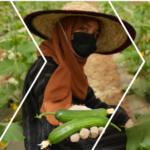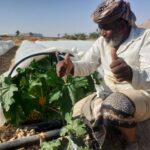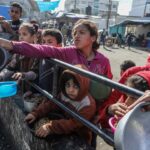The Near East and North Africa (NENA) region faces a growing number of complex, overlapping and compounding hazards that are undermining livelihoods, deepening food insecurity and slowing economic development. Increasingly frequent and severe climate extremes – such as droughts, flash floods, heatwaves – are converging with transboundary plant and animal diseases, protracted conflicts and economic volatility. These risks disproportionately impact the agricultural sector, which remains a cornerstone of rural livelihoods and food systems in the region..
Solar Irrigation in Yemen: Promising Impacts Several Months Post Implementation
Technical support component of the intervention was in the form of technical training through agronomists and linking the beneficiaries with other market players such as input suppliers and microfinance institutions. Beneficiaries received technical training on the components and operation of solar-powered water pumps, including the different types available and their respective advantages and disadvantages, and the daily and periodic maintenance required to keep solar-powered pumps functioning optimally
One year of war in Gaza: Food emergency continues with no end in sight
With conflict in the Middle East now escalating into Lebanon and beyond, Palestinians in the Gaza Strip continue to face dire food security conditions. One year has passed since the October 7, 2023 Hamas attacks on Israeli civilians, triggering the Israeli military retaliation and war that have killed more than 41,000 Palestinians and devastated the livelihoods of Gaza’s population of over 2 million.
Towards Advancing Children’s Nutritional Intake: Taking Stock of Evidence-based Effective School Feeding Programs in the Middle East and North Africa
The International Food Policy Research Institute (IFPRI) in partnership with the Consultative Group on International Agricultural Research (CGIAR) Fragility, Conflict and Migration (FCM) initiative organized a policy seminar titled “Towards Advancing Children’s Nutritional Intake: Taking Stock of Evidence-based Effective School Feeding Programs in the Middle East and North Africa”. The seminar presented findings from a recent randomized controlled trial, funded by partners from the private sector including HSA Group, and Tetra Pak, on the effectiveness of school feeding programs (SFPs) in emergency and humanitarian contexts.
Bridging Evidence and Policy (BEP) Seminar Series: Crises and Response – Development and Humanitarian in the MENA
Vulnerable communities in the Arab world and MENA region face numerous challenges, including conflicts, resource scarcity, and inequality which exacerbate their situation. The COVID-19 pandemic, rising food prices due to conflicts, natural disasters, and ongoing conflicts in Yemen, Sudan, and Palestine further hinder development opportunities in the region
- 1
- 2
- 3
- …
- 14
- Next Page »





